
Dit was twee jaar terug de uitslag van de briefstemmen buiten Nederland, die als ik mijn research goed gedaan heb pas altijd, de dag na de verkiezingen dus vandaag op donderdag worden geteld. Dan moet D66 dat verschil van nu 1382 stemmen op de PVV makkelijk kunnen inlopen.
30.10.2025 09:20 — 👍 4 🔁 1 💬 0 📌 1

Peilingen duiden: 10 essentiële vuistregels voor duiders - StukRoodVlees
Zetelpeilingen worden vaak misbruikt. Een tiental vuistregels om je publiek niet voor te liegen met non-nieuws.
Ook de laatste dagen van deze verkiezingscampagne is het belangrijk dat redacties en duiders - zeker ook die van talkshows, podcasts, of internetpagina's - peilingen op een juiste manier gebruiken.
stukroodvlees.nl/peilingen-du...
Dus niet cherrypicken: één bron is geen bron.
25.10.2025 17:13 — 👍 28 🔁 12 💬 0 📌 2
De mythe die niet sterft
Ook vandaag herhaalt Vullings dat de PvdA toch écht kiezers verloor aan de PVV. Nadat Marleen de Rooy de uitspraak van Yesilgöz terecht weerlegde (over de PvdA die veel kiezers zou hebben verloren aan de PVV), stelt Vullings dat die overloop langer geleden was dan in 2023.
13.06.2025 18:06 — 👍 286 🔁 117 💬 31 📌 13
PhD Researcher - Scientific project on Education-based social identities
PhD Researcher - Scientific project on Education-based social identities
Only 10 days left to apply for this phd position on education-based identities, status, and political attitudes! Open to those interested in sociology, social psychology, political science, communication science or indeed a combination of all.
jobs.vub.be/job/Elsene-P...
13.06.2025 08:36 — 👍 14 🔁 18 💬 0 📌 0
If you are at the @ecpr-ead.bsky.social conference, come to @liranharsgor.bsky.social's panel on Tuesday 15:00 - 16:30 and hear Armin's talk. We document a growing gap in satisfaction with democracy between the lower and the higher educated using APC- analyses of Eurobarometer and ESS data.
09.06.2025 20:46 — 👍 23 🔁 6 💬 0 📌 1
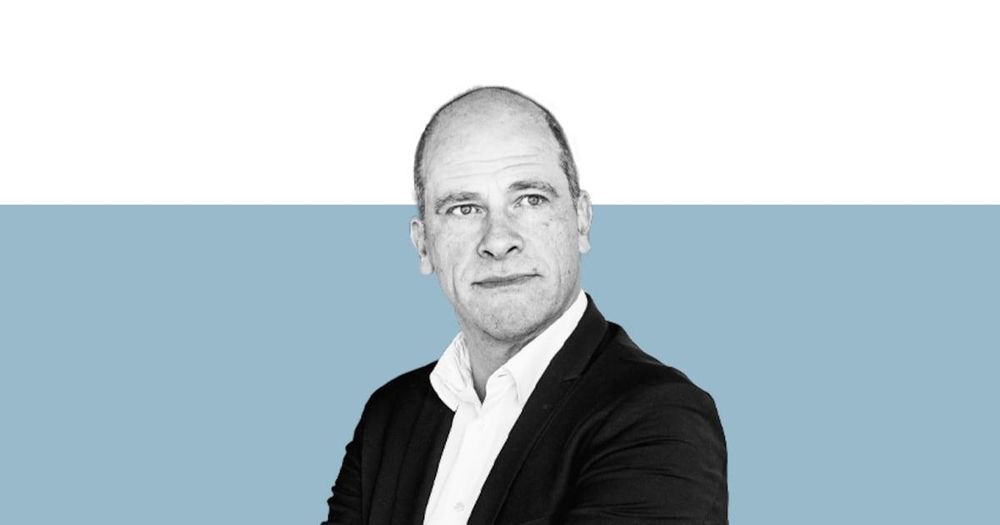
Laten we er de allersaaiste verkiezingscampagne ooit van proberen te maken
Laten we er de allersaaiste verkiezingscampagne ooit van proberen te maken
04.06.2025 17:26 — 👍 32 🔁 8 💬 5 📌 12

Polarisatie en wantrouwen in politiek wordt gevoed door juist dit soort sneren als nieuws te pushen. Nieuwsmedia zoals @nu.nl zouden beter moeten weten.
04.06.2025 10:43 — 👍 27 🔁 8 💬 1 📌 1

Postdoctoral researcher Sociology; Understanding climate change attitudes
What does climate change mean to people—and why? And how do these meanings shape public responses to policy and information campaigns?
📢 We're hiring a 4-year postdoc (0.8 FTE) at Erasmus Univ. Rotterdam for project on climate change meanings
Focus: Italian case (focus groups, survey, experiments)
PhD in Sociology (or related), fluent in Italian
🗓️ Deadline: June 11
#postdoc #sociology #academicjobs #Italy #climatechange
20.05.2025 16:10 — 👍 8 🔁 13 💬 0 📌 1
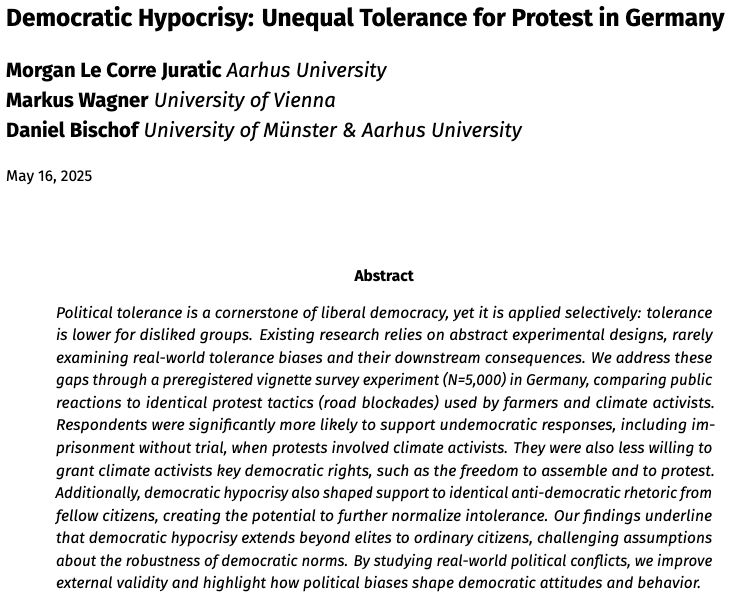
🚨 working paper (w. @morganlcj.bsky.social @markuswagner.bsky.social): Protesters are not judged equally - even if tactics of groups are similar.
We ran an experiment in 🇩🇪 testing how people react to farmers vs. climate activists blocking roads.
What we find is disturbing:
osf.io/preprints/os...
16.05.2025 12:59 — 👍 361 🔁 147 💬 10 📌 23


De rode lijn is ver overschreden. Terwijl het kabinet Wilders-Yeşilgöz wegkijkt terwijl de regering van Netanyahu zich schuldig maakt aan oorlogsmisdaden, gaan Nederlanders de straat op met een heldere boodschap: kabinet, spreek je uit en voer de druk op! 1/3
18.05.2025 14:33 — 👍 915 🔁 142 💬 27 📌 8
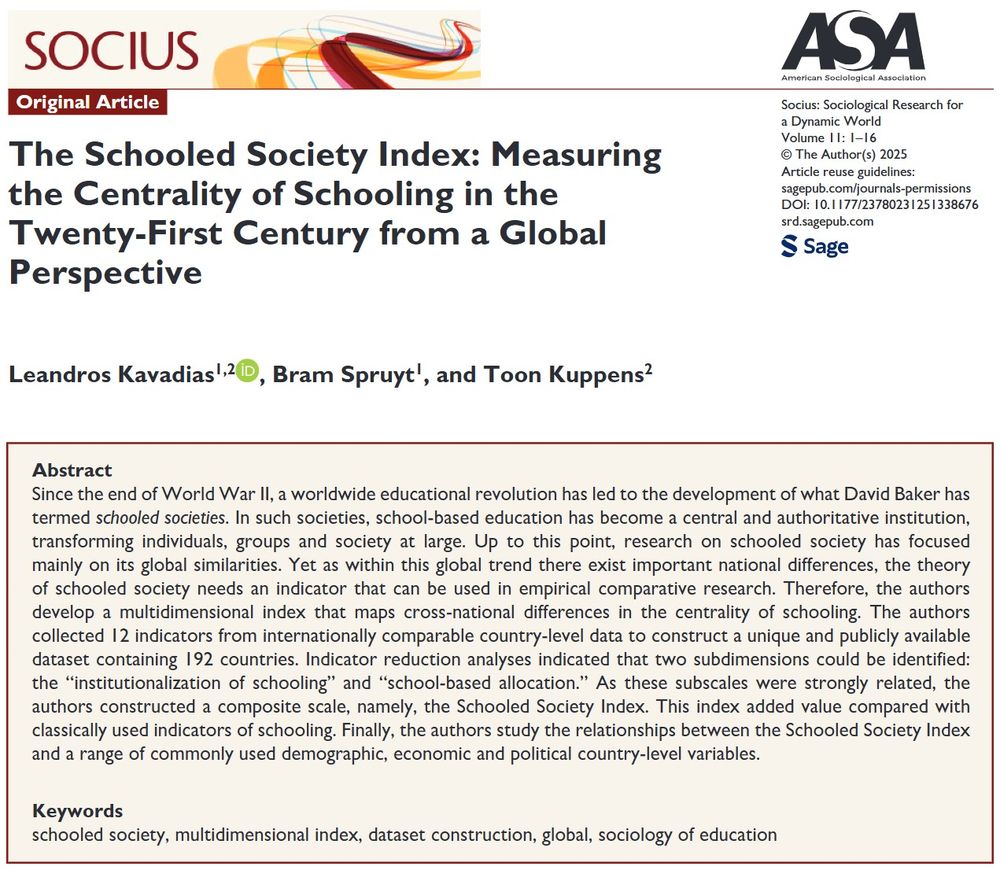
🏫 How central is schooling in your country?
In their new #Socius study, Drs. Kavadias, @bramspruyt.bsky.social & @tkupp.bsky.social introduce the Schooled Society Index—a global measure of how #education acts as a force of #institutionalization and #stratification.
Read: doi.org/10.1177/2378...
15.05.2025 19:31 — 👍 14 🔁 7 💬 1 📌 0
En daar is hij weer! Joost Vullings @eenvandaag.nl in podcast de stemming: "de pvda heeft de hoop die pvv kiezer waarvan in oorsprong een heel deel uit de sociaaldemocratie komt aan te trekken." Een stelling die meerdere keren als foutief is aangetoond, maar toch als een soort zombie wordt herhaalt🧵
11.04.2025 17:40 — 👍 230 🔁 84 💬 19 📌 21

📢Proud to share my first publication in European Union Politics, now online and #OpenAccess! I examine which of 19 European countries (1990–2017) saw culture wars emerge in public opinion. I analyze how opinions and identities on morality and economic issues aligned into distinct ideological camps🧵
17.03.2025 17:43 — 👍 21 🔁 4 💬 6 📌 1
Congrats Tadeas!
18.03.2025 13:52 — 👍 1 🔁 0 💬 1 📌 0
Mooie meta-analyse in lijn met ons paper in PSPB èn met ons stuk in de Volkskrant: duidelijke ingroup bias onder hoger opgeleiden (en niet onder lager opgeleiden) in hun stemvoorkeuren
11.03.2025 17:32 — 👍 0 🔁 0 💬 0 📌 0
Hebben we net Frans en Duits afgeschaft, blijkt de toekomst Frans en Duits te zijn.
06.03.2025 11:02 — 👍 503 🔁 100 💬 37 📌 5

Volume 41 Issue 1 | European Sociological Review | Oxford Academic
Publishes original articles in all fields of sociology ranging in length from short research notes up to major reports. It provides a resource of state-of-the-art quantitative and comparative researc...
First issue of 2025 is out! New research findings -most #openaccess- at academic.oup.com/esr/issue/41/1
With contributions by @frankvantubergen.bsky.social @aliciagsierra.bsky.social @martinkolk.bsky.social @nellageurts.bsky.social @jochemvannoord.eu & many more (not found in BS, sorry if they are)
13.02.2025 06:35 — 👍 21 🔁 7 💬 0 📌 0
Over die mythe van de ‘verloren arbeider’ aan rechts 🧵
Sociaaldemocratisch links stond massaal kiezers af, maar verloor die de afgelopen decennia in overgrote meerderheid aan groene partijen, andere linkse partijen en liberale (midden)partijen. 1/6
11.02.2025 09:55 — 👍 274 🔁 119 💬 24 📌 32
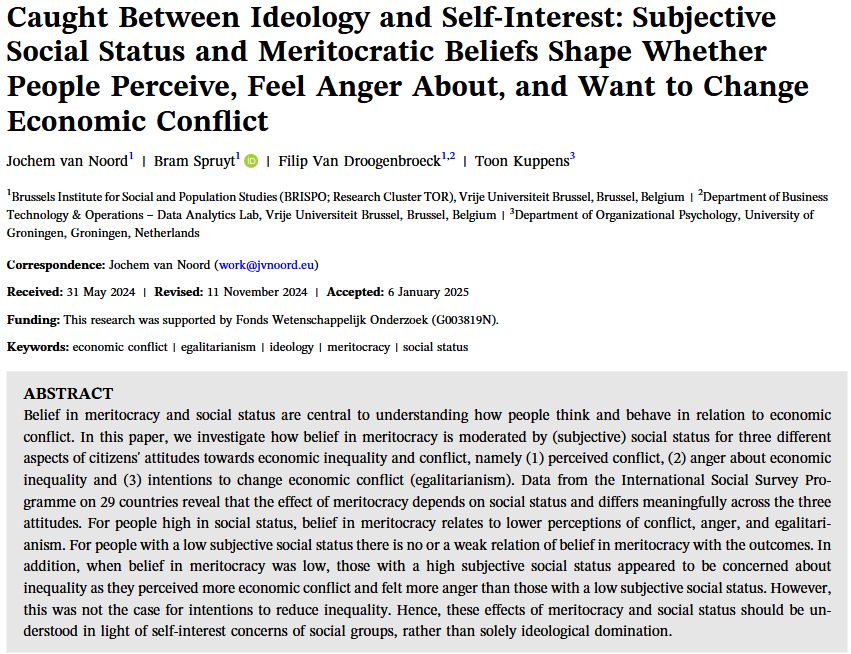
Title page of "Caught Between Ideology and Self‐Interest: Subjective
Social Status and Meritocratic Beliefs Shape Whether
People Perceive, Feel Anger About, and Want to Change
Economic Conflict"
Abstract: "Belief in meritocracy and social status are central to understanding how people think and behave in relation to economic conflict. In this paper, we investigate how belief in meritocracy is moderated by (subjective) social status for three different aspects of citizens' attitudes towards economic inequality and conflict, namely (1) perceived conflict, (2) anger about economic inequality and (3) intentions to change economic conflict (egalitarianism). Data from the International Social Survey Programme on 29 countries reveal that the effect of meritocracy depends on social status and differs meaningfully across the three attitudes. For people high in social status, belief in meritocracy relates to lower perceptions of conflict, anger, and egalitarianism. For people with a low subjective social status there is no or a weak relation of belief in meritocracy with the outcomes. In addition, when belief in meritocracy was low, those with a high subjective social status appeared to be concerned about inequality as they perceived more economic conflict and felt more anger than those with a low subjective social status. However, this was not the case for intentions to reduce inequality. Hence, these effects of meritocracy and social status should be understood in light of self-interest concerns of social groups, rather than solely ideological domination."
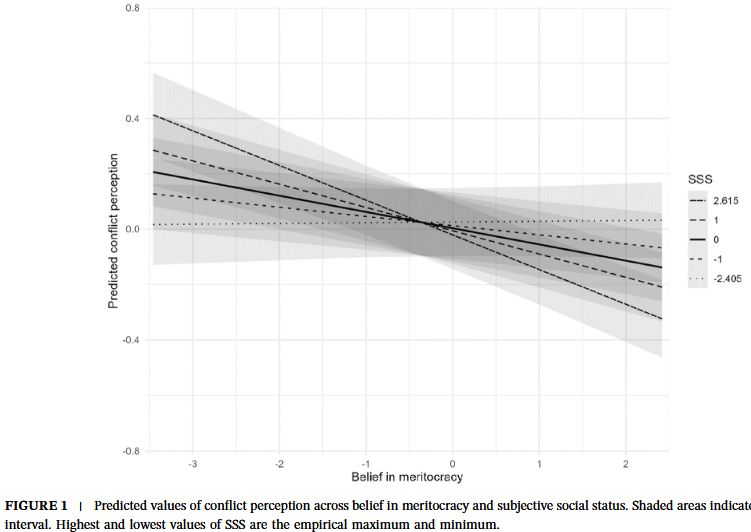
Figure 1: Predicted values of conflict perception across belief in meritocracy and subjective social status.
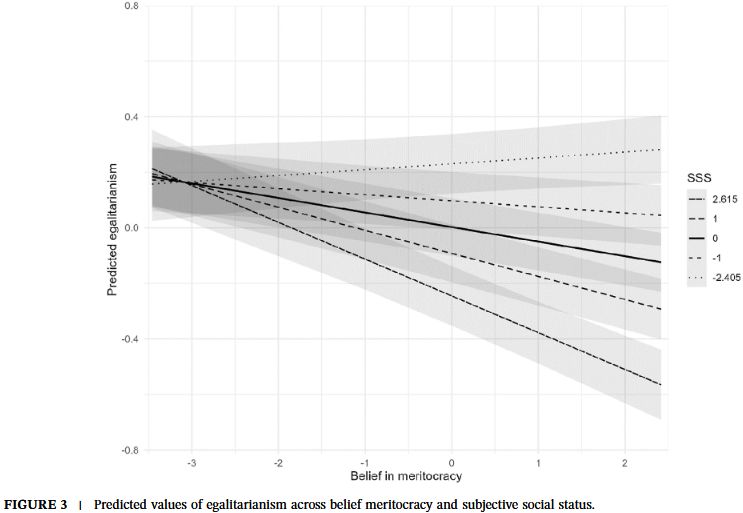
Figure 3: Predicted values of egalitarianism across belief meritocracy and subjective social status.
🏁New paper! Social status moderates the effect of belief in meritocracy on economic conflict attitudes. Meritocracy doesn't always legitimize inequality and sometimes it does more :)
Published with @bramspruyt.bsky.social Filip Van Droogenbroeck and @tkupp.bsky.social
doi.org/10.1111/1468...
07.02.2025 12:31 — 👍 21 🔁 11 💬 1 📌 1
We argue that effects of meritocracy should be seen in light of self-interest concerns and ideological sophistication. These things differ across social status groups, giving different results across different groups and attitudes. This nuances (simple) ideological domination accounts.
07.02.2025 12:31 — 👍 0 🔁 0 💬 0 📌 0

Title page of "Caught Between Ideology and Self‐Interest: Subjective
Social Status and Meritocratic Beliefs Shape Whether
People Perceive, Feel Anger About, and Want to Change
Economic Conflict"
Abstract: "Belief in meritocracy and social status are central to understanding how people think and behave in relation to economic conflict. In this paper, we investigate how belief in meritocracy is moderated by (subjective) social status for three different aspects of citizens' attitudes towards economic inequality and conflict, namely (1) perceived conflict, (2) anger about economic inequality and (3) intentions to change economic conflict (egalitarianism). Data from the International Social Survey Programme on 29 countries reveal that the effect of meritocracy depends on social status and differs meaningfully across the three attitudes. For people high in social status, belief in meritocracy relates to lower perceptions of conflict, anger, and egalitarianism. For people with a low subjective social status there is no or a weak relation of belief in meritocracy with the outcomes. In addition, when belief in meritocracy was low, those with a high subjective social status appeared to be concerned about inequality as they perceived more economic conflict and felt more anger than those with a low subjective social status. However, this was not the case for intentions to reduce inequality. Hence, these effects of meritocracy and social status should be understood in light of self-interest concerns of social groups, rather than solely ideological domination."

Figure 1: Predicted values of conflict perception across belief in meritocracy and subjective social status.

Figure 3: Predicted values of egalitarianism across belief meritocracy and subjective social status.
🏁New paper! Social status moderates the effect of belief in meritocracy on economic conflict attitudes. Meritocracy doesn't always legitimize inequality and sometimes it does more :)
Published with @bramspruyt.bsky.social Filip Van Droogenbroeck and @tkupp.bsky.social
doi.org/10.1111/1468...
07.02.2025 12:31 — 👍 21 🔁 11 💬 1 📌 1

Opinion | Two of the World’s Leading Thinkers on How the Left Went Astray (Gift Article)
Thomas Piketty and Michael Sandel debate the value of open borders and what we owe migrants.
This conversation between Thomas Piketty and Michael Sandel took my understanding of the current political moment to a higher level. I've gifted it to Bluesky, so the paywall at the NY Times won't interfere with your reading.
19.01.2025 03:12 — 👍 55 🔁 20 💬 4 📌 6
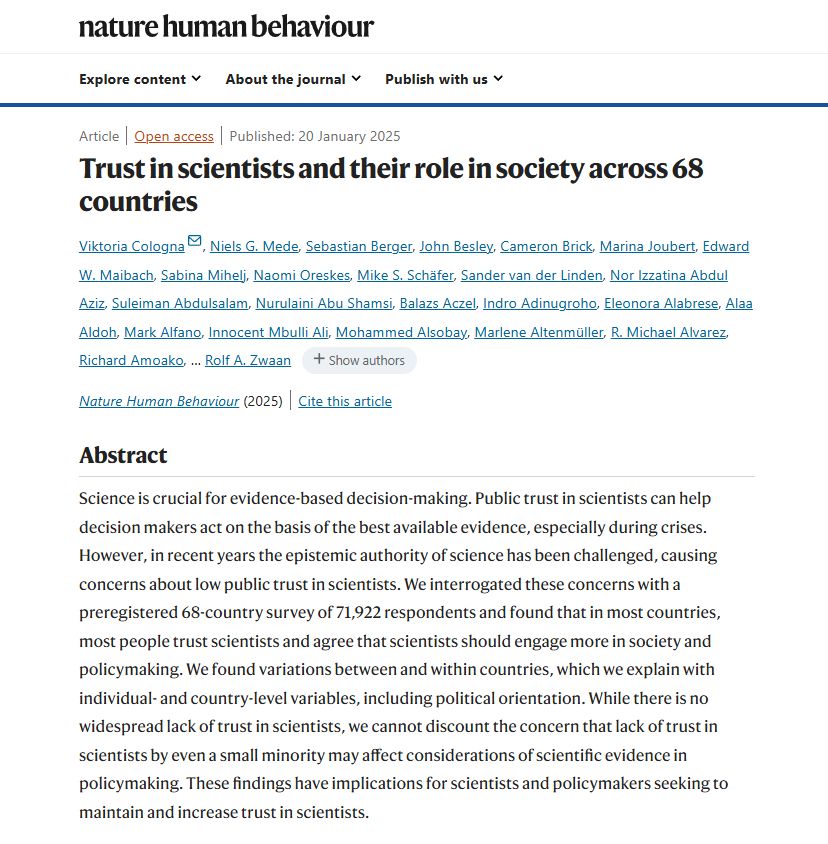
Out now in Nature Human Behaviour: Our 68-country #survey on public attitudes to #science 📣
It shows: People still #trust scientists and support an active role of scientists in society and policy-making. #OpenAccess available here: www.nature.com/articles/s41... @natureportfolio.bsky.social
(1/13)
20.01.2025 10:27 — 👍 363 🔁 164 💬 7 📌 21
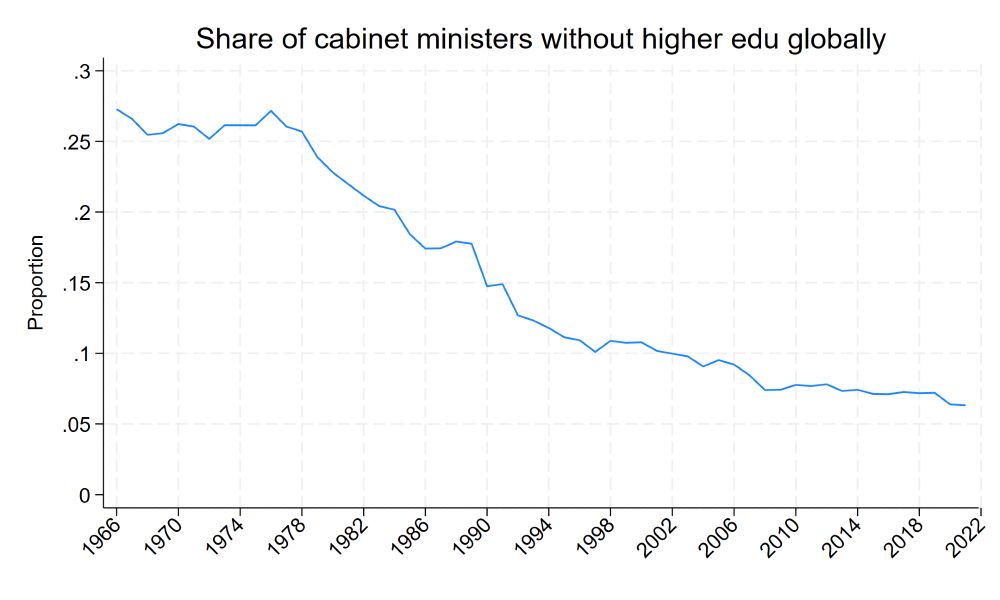
And here's the share without higher education!
09.01.2025 13:36 — 👍 10 🔁 3 💬 1 📌 1

Mine and @dvandebroeck.bsky.social’s paper on ‘The Labor of Distinction’ is out now in ASR. Drawing from an ethnography that involved training and working as a butler, we tell a larger story about elites and inequality (1/18) journals.sagepub.com/doi/10.1177/...
08.01.2025 21:39 — 👍 76 🔁 32 💬 2 📌 3
and this is why it is an analytical mistake to use “voter without a college degree” to mean “working class voter”
24.11.2024 22:17 — 👍 2049 🔁 271 💬 36 📌 6
There is verification on this site - via using a domain name as your username.
samcoatessky could likewise be fake. But if Sky made samcoates(dot)sky(dot)social that they could do right away, we’d know it was legit.
Tories could do likewise.
17.11.2024 22:53 — 👍 83 🔁 24 💬 9 📌 3
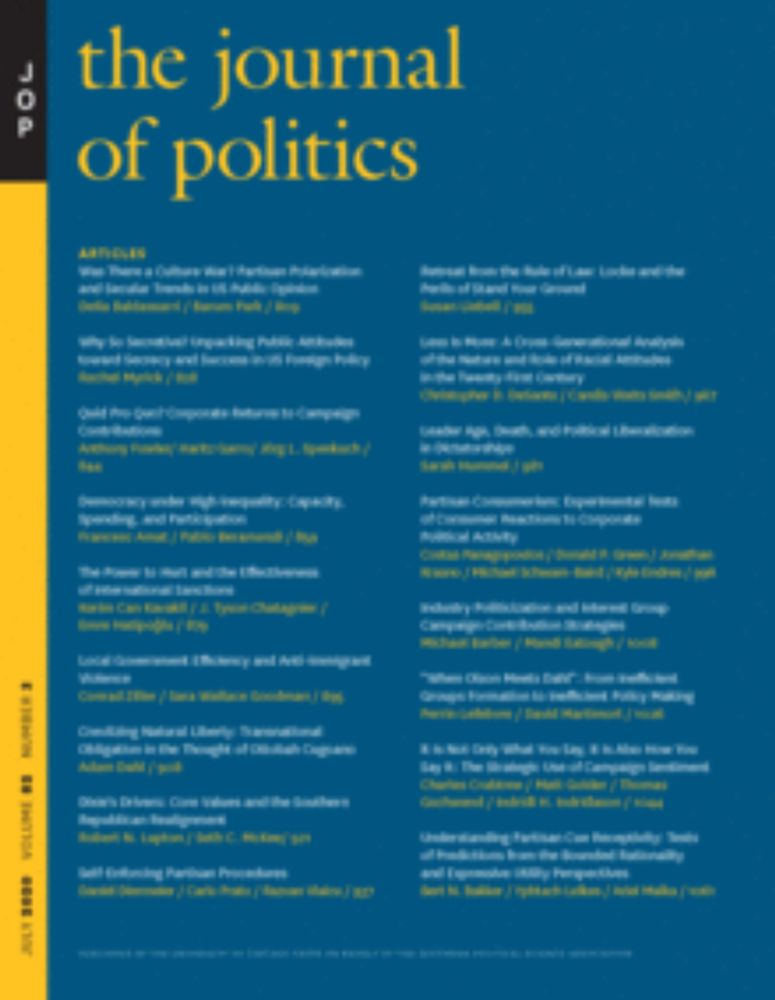
Education as identity? A meta-analysis of education-based in-group preferences in candidate choice experiments | The Journal of Politics: Vol 0, No ja
Do we systematically prefer educated candidates? Or do educational groups select in ways that reward their own?
A note at @thejop.bsky.social by @turnbulldugarte.bsky.social and I suggests the answers are yes, and yes – but only for the graduate group.
www.journals.uchicago.edu/doi/abs/10.1...
09.04.2024 09:32 — 👍 13 🔁 10 💬 1 📌 0
Muziek, voetbal en eten.
Draait plaatjes op NPO Radio 2 (zondag 18-21 u), werkt voor de NTR (Top 2000 a Gogo, Untold Stories ea), schrijft, vertelt en houdt heel erg van muziek. Contact hier of via leoblokhuis.nl.
The European Federation of Public Service Unions (EPSU), organising 8 million public service workers across Europe.
General Secretary: @jwgoudriaan.bsky.social
Onderzoeker bij Ipsos I&O. Politiek - samenleving - overheid - duurzaamheid
Voormalig toezichthouder, schrijver van stukjes, nerd, amateur wetenschapper. Spreekt namens niemand. https://berthub.eu/
Journalist. Publisher of Wealth of Nations newsletter on Substack. Previously chief leader writer and columnist @TheTimes, chief Europe commentator @WSJ. Runner, cold water swimmer, aspiring chef.
https://nixons.substack.com/
Solar analyst at BloombergNEF, goose keeper. Author of a book, "Solar Power Finance Without the Jargon". Opinions all my own.
Chasing digital badness. Senior Researcher at Citizen Lab, but words here are mine.
Vakbond, auteur (Fantoomgroei & De prijs van ophef), maker van Radio Vrij Nederland
Inequality Economist, former trader and author of The Trading Game. Other Economists make predictions, but my ones are actually right.
https://linktr.ee/garysecon
Senior Policy Fellow @delorsberlin.bsky.social | Franco-German relations | France and Germany in Europe
The EU channel for scientists & researchers: opportunities to fund your ideas, updates from EU-funded science, and scientific resources you can use in your work.
The best and the worst of bsky dot app
Tag or dm for submissions
Was Kamerlid. Is socialist. En voorzitter van de Nederlandse Vechtsportbond. En waardeloos kickbokser. Maakt Bright Lights, een podcast over country. FEYENOORD!
founder & ceo blacksky algorithms [ @blackskyweb.xyz ]
affiliate berkman klein center @harvard.edu
move fast and break chains
organizer wethepeople.nyc
high-tech low-life; cyber artist
📧 support@blacksky.app
linkat.blue/rude1.blacksky.team
Professor of EU and Human Rights Law, Royal Holloway University of London. Usual disclaimers.
Fietsflik, Commissaris/Commissaire Team Polbru 👮🏻♂️🚲🛵🚔👮🏾,🏃♥️BXL 🇧🇪🤝Positivo #tousensemble #samensterker
Tweede Kamerlid GroenLinks-PvdA || Onderwijs & Financiën























